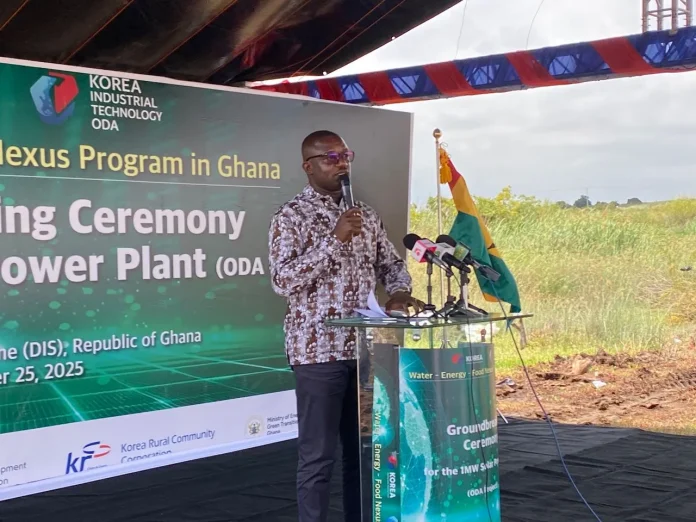Ghana has officially launched construction of a groundbreaking $5 million solar power facility that could reshape the country’s approach to food production while tackling the persistent challenge of rain-dependent farming.
Energy and Green Transition Minister John Abdulai Jinapor broke ground for the 1-megawatt solar plant at Dawhenya this week, marking what he described as “a foundation for innovation, sustainability, and prosperity for generations.” The project represents more than just renewable energy infrastructure—it’s Ghana’s bold attempt to link climate action directly with food security.
The initiative emerges from Korea’s Water-Energy-Food Nexus Project (WEFP), demonstrating how international partnerships can address multiple development challenges simultaneously. The project, estimated at $5 million, covers construction, training of ministry staff on operation and management of the plant, and other technical assistance, with completion expected within eight to twelve months.
What makes this project particularly compelling isn’t just its renewable energy component—it’s the recognition that Ghana’s agricultural productivity remains trapped by outdated approaches. Currently, only three percent of the country’s cultivated land benefits from irrigation, despite having potential to irrigate up to 1.9 million hectares. Meanwhile, the one megawatt solar facility for the Dawhenya Irrigation Scheme is expected to boost the nation’s renewable energy stock from 3.5 percent to 5.2 percent by next year.
Jinapor didn’t mince words about the severity of Ghana’s agricultural challenges. “South Korea had irrigated over one million hectares as far back as 2009, while Ghana continues to rely largely on rainfall. This must change,” he declared during the groundbreaking ceremony.
The timing couldn’t be more crucial. Food inflation has emerged as a major driver behind Ghana’s overall 23.8 percent inflation rate in 2024, with staples like rice, yam, and tomato experiencing sharp price increases that squeeze household budgets across the country.
But here’s where the project gets really interesting: it’s not just about this single facility. The government has unveiled an ambitious irrigation plan targeting more than one million hectares within five years. The rollout begins with 400 solar-powered water pumps in 2026, scaling dramatically to 3,500 pumps by 2028 to irrigate approximately 400,000 hectares.
The Korean partnership brings serious technical expertise to the table. The Korea Association of Machinery Industry (KOAMI), established in 1969 as a nonprofit manufacturers’ association, leads the technical cooperation alongside other Korean institutions. Kunhwa Engineering and Consulting Co., Ltd., founded in 1990, has grown into a leading civil consulting and engineering firm in Korea, and they’ve been working closely with Ghanaian agencies since 2023 to overcome design challenges.
Kim Hyunjoo, Second Secretary at the Korean Embassy, positioned the project within broader diplomatic frameworks, connecting Ghana’s “Feed Ghana” Programme to Korea’s “K-Rice Belt” initiative. This isn’t just technical cooperation—it’s agricultural diplomacy in action.
The WEFP seeks to develop 100 hectares of mechanised and irrigated farmland to produce more than 1,200 tons of quality rice seeds annually, providing clean sustainable energy to power irrigation systems at Dawhenya. That’s a significant boost for local rice production in a country that still imports substantial quantities of the staple grain.
The project addresses what Jinapor called the interconnected nature of modern development challenges. “Without clean, affordable, and reliable energy, irrigation systems cannot function; without water, we cannot grow food; and without food, our people cannot thrive,” he explained.
Implementation involves multiple Ghanaian institutions working together: the Ministry of Energy and Green Transition coordinates with the Ministry of Finance, Energy Commission, Electricity Company of Ghana (ECG), and Ghana Irrigation Development Authority (GIDA). It’s the kind of multi-agency approach that successful development projects require but don’t always achieve.
The facility will deliver reliable power for irrigation while cutting dependence on expensive diesel generators—a win for both farmers’ operating costs and Ghana’s climate commitments. The project also promises to create green jobs, particularly for young people and women within agricultural value chains.
Kyu Young Hwang, President and CEO of Kunhwa Engineering, expressed pride in reaching this milestone after navigating design complexities. The company completed the design phase in 2024, setting the stage for actual construction to begin.
Jinapor urged local farmers and residents to protect the facility while reclaiming encroached irrigation lands for productive use. He also disclosed ongoing negotiations with the Finance Ministry to secure tax exemptions on imported materials and equipment—a practical detail that could significantly impact project costs.
“This is not just about electricity. It is about food on the table, jobs for our youth, and climate-smart farming for a resilient future,” the minister emphasized, capturing the project’s broader significance beyond its technical specifications.
The Dawhenya solar plant represents something Ghana desperately needs: proof that renewable energy and food security can advance together rather than competing for resources and attention. If successful, it could serve as a template for replicating across the country’s other agricultural regions.
Source: newsghana.com.gh











